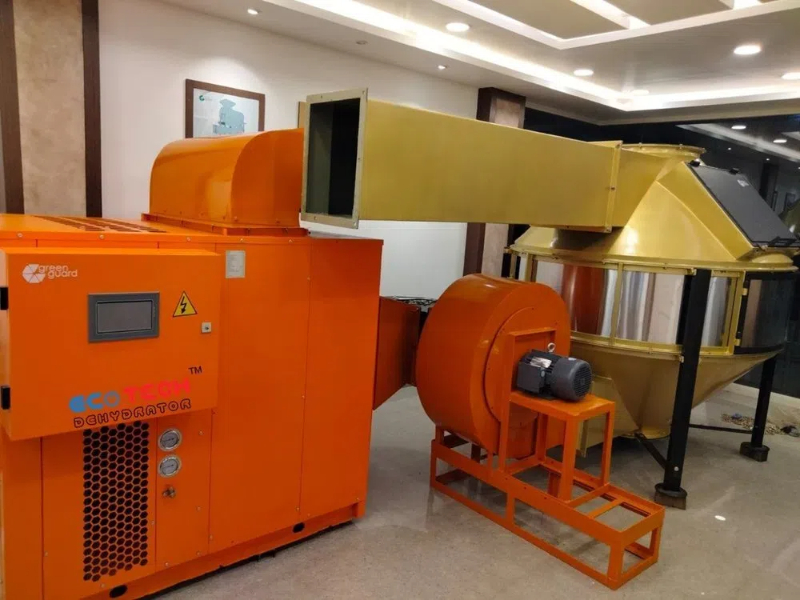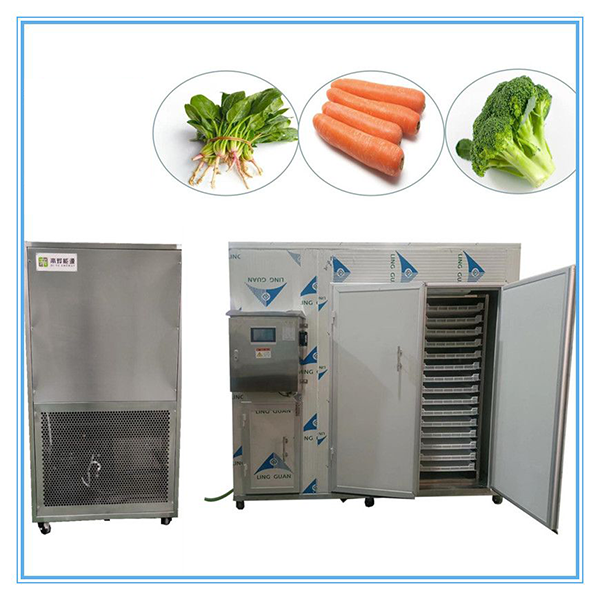
Content Menu
● Introduction
● What is an Air Dry Food Machine?
● Types of Air Dry Food Machines
>> 1. Home Food Drying Equipment
>> 2. Commercial Food Dehydrator
>> 3. Industrial Air Dry Machine
● Benefits of Using an Air Dry Food Machine
>> 1. Extended Food Shelf Life
>> 2. Preservation of Nutrients
>> 3. Enhanced Flavors
>> 4. Cost-Effective
>> 5. Reduced Food Waste
● Popular Foods to Dehydrate
>> 1. Fruits
>> 2. Vegetables
>> 3. Meats
>> 4. Herbs and Spices
● Choosing the Right Air Dry Food Machine
>> 1. Capacity
>> 2. Temperature Control
>> 3. Airflow Design
>> 4. Energy Efficiency
>> 5. Material
● Tips for Successful Food Dehydration
● The Future of Food Dehydration
● Conclusion
● Frequently Asked Questions
>> 1. What is the difference between a food dehydrator and an air fryer?
>> 2. Can I use an air dry food machine to make pet treats?
>> 3. How long does it take to dehydrate food in an air dry food machine?
>> 4. Are there any foods that shouldn't be dehydrated?
>> 5. How do I clean and maintain my air dry food machine?
Introduction
In today's fast-paced world, where convenience and health-consciousness go hand in hand, air dry food machines have become increasingly popular. These versatile appliances, also known as food dehydrators, offer a simple yet effective way to preserve a wide variety of foods while retaining their nutritional value and enhancing their flavors. Whether you're a health enthusiast, a busy parent, or a culinary adventurer, understanding the ins and outs of air dry food machines can revolutionize your approach to food preservation and preparation.
What is an Air Dry Food Machine?
An air dry food machine, commonly referred to as a food dehydrator, is a device designed to remove moisture from food items. This process of dehydration has been used for centuries as a method of food preservation, but modern technology has made it more efficient and accessible than ever before.
These machines work by circulating warm air around the food, gradually evaporating the moisture content. The result is dried food that can be stored for extended periods without spoiling, while still retaining much of its nutritional value and flavor.

Types of Air Dry Food Machines
1. Home Food Drying Equipment
For individuals and families looking to explore food dehydration, home food drying equipment offers an excellent entry point. These compact machines are designed for kitchen countertops and typically feature multiple trays that can accommodate various types of foods.
2. Commercial Food Dehydrator
Businesses in the food industry often require larger-scale solutions. Commercial food dehydrators are built to handle higher volumes and operate continuously. They often come with advanced features for temperature control and timing.
3. Industrial Air Dry Machine
For large-scale food processing, industrial air dry machines are the go-to choice. These massive units can handle industrial quantities of food and are often customized to meet specific production requirements.
Benefits of Using an Air Dry Food Machine
1. Extended Food Shelf Life
One of the primary advantages of using an air dry food machine is the significant extension of food shelf life. By removing moisture, you create an environment inhospitable to bacteria and mold growth, allowing foods to be stored for months or even years.
2. Preservation of Nutrients
Unlike some other preservation methods, air drying food helps retain a significant portion of the original nutrients. Vitamins, minerals, and enzymes are largely preserved, making dried foods a nutritious option.
3. Enhanced Flavors
Dehydration concentrates the natural flavors in foods, often resulting in a more intense and enjoyable taste experience. This is particularly noticeable with fruits and herbs.
4. Cost-Effective
By allowing you to buy foods in bulk when they're in season and preserve them for later use, air dry food machines can lead to significant cost savings over time.
5. Reduced Food Waste
Instead of letting excess produce go to waste, you can dehydrate it for future use, reducing overall food waste in your household or business.
Popular Foods to Dehydrate
1. Fruits
Fruits are among the most popular items to dehydrate. From apples and bananas to more exotic options like mangoes and kiwis, dried fruits make excellent snacks and ingredients for various recipes.
2. Vegetables
A wide range of vegetables can be successfully dehydrated, including tomatoes, carrots, peppers, and leafy greens. These can be rehydrated for use in soups, stews, and other dishes.
3. Meats
Meat drying appliances are particularly useful for creating jerky and other dried meat products. This process not only preserves the meat but also creates a protein-rich snack.
4. Herbs and Spices
Drying herbs and spices in an air dry food machine helps preserve their potent flavors for use in cooking throughout the year.

Choosing the Right Air Dry Food Machine
When selecting an air dry food machine, several factors should be considered:
1. Capacity
Consider how much food you plan to dehydrate regularly. Home users might be satisfied with a compact, multi-tray food dehydrator, while commercial operations may require industrial-sized equipment.
2. Temperature Control
Look for machines that offer precise temperature control. Different foods require different drying temperatures for optimal results.
3. Airflow Design
Efficient airflow is crucial for even drying. Some models feature horizontal airflow, which is generally more effective than vertical designs.
4. Energy Efficiency
An energy-efficient food dryer can help keep operating costs down, especially for frequent users.
5. Material
Stainless steel dehydrators are durable and easy to clean, making them a popular choice for both home and commercial use.
Tips for Successful Food Dehydration
To get the most out of your air dry food machine, consider these tips:
1. Prepare foods uniformly: Cut fruits and vegetables into even pieces to ensure consistent drying.
2. Pre-treat certain foods: Dipping fruits in lemon juice or blanching vegetables can help preserve color and texture.
3. Rotate trays: For even drying, rotate the trays periodically during the dehydration process.
4. Store properly: Once dried, store foods in airtight containers in a cool, dark place.
5. Experiment with flavors: Try adding spices or marinades before drying to create unique flavor profiles.
The Future of Food Dehydration
As technology advances, we can expect to see even more innovative features in air dry food machines. From smart controls that allow remote monitoring via smartphone apps to more energy-efficient designs, the future of food dehydration looks promising.
Moreover, with the growing interest in sustainable living and reducing food waste, air dry food machines are likely to become even more prevalent in homes and businesses alike. Their ability to preserve seasonal produce and create nutritious, long-lasting food aligns perfectly with the global push towards more sustainable food systems.
Conclusion
Air dry food machines offer a versatile, efficient, and health-conscious approach to food preservation. Whether you're looking to create healthy snacks, preserve your garden's bounty, or streamline commercial food production, these devices provide a valuable solution. By understanding the types of machines available, the foods best suited for dehydration, and the key factors to consider when choosing a dehydrator, you can make informed decisions that will enhance your culinary experiences and contribute to a more sustainable lifestyle.
As we continue to seek ways to maximize nutrition, minimize waste, and enjoy flavorful foods year-round, air dry food machines stand out as a technology that bridges traditional preservation methods with modern convenience. Whether you're a home cook or a food industry professional, exploring the world of food dehydration can open up new possibilities for creativity, nutrition, and sustainability in your kitchen.

Frequently Asked Questions
1. What is the difference between a food dehydrator and an air fryer?
Answer: While both appliances use hot air circulation, they serve different purposes. A food dehydrator removes moisture from food at low temperatures over long periods to preserve it, while an air fryer cooks food quickly at high temperatures to create a crispy exterior, similar to frying.
2. Can I use an air dry food machine to make pet treats?
Answer: Yes, many pet owners use food dehydrators to make healthy, preservative-free treats for their pets. Popular options include dried sweet potato slices, dehydrated meat jerky, and dried fruit chips.
3. How long does it take to dehydrate food in an air dry food machine?
Answer: Drying times can vary significantly depending on the food type, thickness of slices, and the dehydrator's efficiency. Generally, fruits can take 6-16 hours, vegetables 4-12 hours, and meats 4-12 hours. Always refer to your machine's manual and recipe guidelines for specific timing.
4. Are there any foods that shouldn't be dehydrated?
Answer: While most foods can be dehydrated, some are not recommended due to safety concerns or poor results. These include high-fat content foods like avocados, fatty meats, and dairy products. Additionally, eggs and foods with high oil content don't dehydrate well.
5. How do I clean and maintain my air dry food machine?
Answer: Most dehydrator trays and components are dishwasher safe, but always check your machine's manual. For the main unit, wipe it down with a damp cloth after each use. Regularly check and clean air vents to ensure proper airflow. Some models may require occasional lubrication of the fan motor – consult your manual for specific maintenance instructions.












